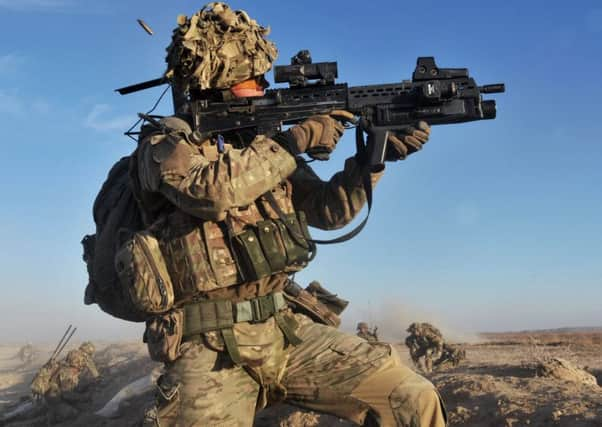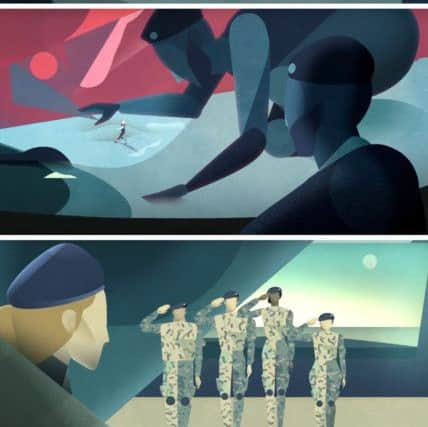British Army's new £1.6m diversity drive says '˜it's okay for soldiers to cry and pray'


Military officials hope the new diversity campaign will encourage recruits from different backgrounds, genders, sexualities and faiths in the army.
The scheme, which will see a series of adverts broadcast on television, radio and digital platforms, is titled ‘This Is Belonging 2018’.
Advertisement
Hide AdAdvertisement
Hide AdThe drive includes a series of animations released on social media, with films asking: ‘Can I be gay in the Army?’ and ‘What if I get emotional in the army?’.


Other videos ask: ‘Can I practise my faith in the Army?’, ‘Will I be listened to in the army?’ and ‘Do I have to be a superhero to join the army?’.
One medic describes wanting to join the army after his brother served in Afghanistan.
‘I was really worried about whether I would be accepted, but within days I was more than confident about being who I was,’ he says.
Advertisement
Hide AdAdvertisement
Hide Ad‘I’m not afraid to talk about having a boyfriend. I thought I’d have to hide it, but once you’ve done it you think: “Why did I have to make it such a big thing for so long?”.’


But retired army officer Major General Tim Cross said he was in favour of recruiting from a broader base to boost the number of soldiers, but stressed they must be able to deliver high-intensity fighting power capable of ‘duffing up the Queen’s enemies’.
He told BBC Radio 4’s Today programme: ‘The concern, I think, for a lot of people – and it’s an understandable concern and to some degree I have some concern as well – is that you end up with an army that’s not capable of doing what you want to do and when you send it away on operations it’s not able to deliver.
‘So we must ensure that we reach out to people, we must ensure that everybody knows that they have an opportunity of joining the British armed forces and joining the army in particular, but we are not going to be soft and we are not going to be nice to people.’
Advertisement
Hide AdAdvertisement
Hide AdMaj Gen Cross warned against discouraging Christians or people from other faiths amid reports that one advert was focused on showing Muslims they could practise their religion while serving as a soldier.
‘It happens to focus on the Muslim community; my point is we have Gurkhas, we have Sikhs, all faiths represented in the British Army, and what we don’t want to be doing is isolating other people by focusing on these particular communities,’ he said.
Colonel Richard Kemp, former commander of British forces in Afghanistan, told BBC Breakfast that he did not ‘subscribe to the view that the British Army is ‘going soft’.
But he said the ad campaign was ‘neglecting the main group of people who are interested in joining’ and will not solve the ‘recruiting crisis’ facing the armed forces.
Advertisement
Hide AdAdvertisement
Hide AdHe said: ‘The main group of people who are interested in joining aren’t worrying so much about whether they are going to be listened to or if there’s an emotional issue.
‘What they are worried about more is how they are going to face combat and, not only that - they are going to be attracted by images of combat because that’s why people join the armed forces.’
He added: ‘This also reflects the fact that the Army, like the rest of government is being forced down a route of political correctness.
‘What is most important is that the Army recruits and is full of soldiers. It’s of secondary importance that they reflect the composition of society.’
Advertisement
Hide AdAdvertisement
Hide AdThe campaign’s release comes weeks after the army faced an outcry over reported plans to scrap its ‘Be the Best’ slogan and historic crest.
Defence secretary Gavin Williamson was forced to intervene and halt the re-branding exercise, which had reportedly been based on market research that found the slogan was considered ‘dated, elitist and non-inclusive’ by key audiences.
The latest public relations exercise focuses on inclusivity, ending with the phrase: ‘Find where you belong’.
In an animation discussing emotional awareness, a voice says: ‘Once you’re in, you realise no one is a machine. The army is family. I’ve probably told them things I wouldn’t tell my own family. There’s always someone there to talk to.’
Advertisement
Hide AdAdvertisement
Hide AdIn another clip the voice says: ‘I grew up with brothers and I always played sports, but I always thought the army was dominated by men and it wasn’t for me. I decided to get a normal job, but men at work would often talk over me. I felt like I didn’t have a voice, so I decided to join the Army. It was totally different, all that matters is that you’re good at your job.’